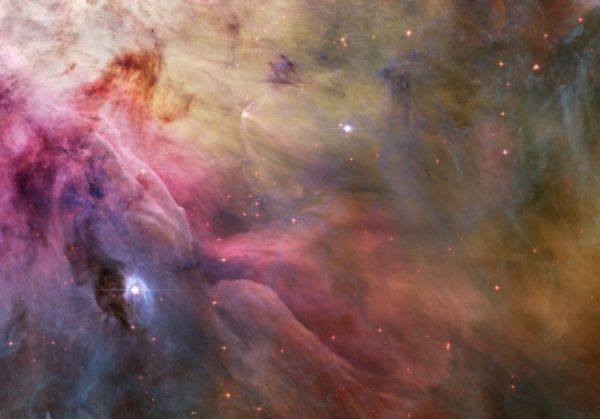"We are not the same persons this year as last; nor are those we love. It is a happy chance if we, changing, continue to love a changed person." -W. Somerset Maugham
After 13.8 billion years have gone by, you might not think that a year makes much of a difference. A year to the Universe is like 0.2 seconds -- the literal blink of an eye -- to a human being. Yet even though changes might be gradual, they’re real, and they very much add up over time.
 A region of the Orion Nebula, one of the largest and most rapidly-star-forming regions where star birth takes place. Image credit: NASA, ESA and the Hubble Heritage Team.
A region of the Orion Nebula, one of the largest and most rapidly-star-forming regions where star birth takes place. Image credit: NASA, ESA and the Hubble Heritage Team.
The Earth’s rotation slows, the Moon moves farther away, the Sun heats up, the Big Bang’s leftover glow cools down, stars are born, the galaxies recede and so much more. If we look closely and precisely enough, we can even measure exactly how -- and by how much -- these changes occur.
More like this
“Look and think before opening the shutter. The heart and mind are the true lens of the camera.” -Yousuf Karsh
“The wonder is, not that the field of the stars is so vast, but that man has measured it.” -Anatole France
“Unless one says goodbye to what one loves, and unless one travels to completely new territories, one can expect merely a long wearing away of oneself and an eventual extinction.” -J
“The illegality of cannabis is outrageous, an impediment to full utilization of a drug which helps produce the serenity and insight, sensitivity and fellowship so desperately needed in this increasingly mad and dangerous world.” -


Ethan. So if a SN did go off in our galaxy, even if behind thick dust, could we miss it? Clearly we wouldn't see it in visible light, but IR, radio, X-ray, and even neutrinos might be capable of announcing its occurrence. So is there much of a chance we could still miss it?
I would like to add a more down to earth change this year.
Our eastern coast line here in New Zealand's south island has recently raised up some 2-6m, plus many new lakes have formed from vast slips, all compliments of a 7.8 magnitude quake.
Nature is amazing, and to get to witness such mountain building processes in my lifetime is a thrill. It comes at a cost though, so thoughts out for all affected.